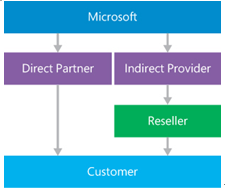It is possible for organizations to purchase Microsoft 365 subscriptions directly from Microsoft individually or by using a variety of volume licensing agreements, including the following:
- Enterprise Agreement (EA) A volume licensing agreement for organizations with at least 500 users or devices seeking to license software for at least three years, which provides discounts of 15 to 45 percent based on the number of users. Available with up-front or subscription payment terms, the agreement includes Software Assurance and the ability to add users and services during the life of the agreement.
- Microsoft Products and Services Agreement (MPSA) An ongoing, partner-based, transactional license agreement for organizations with 250 to 499 users or devices that optionally includes Software Assurance and requires no organization-wide commitment.
- Cloud Solution Provider (CSP) A partner-based licensing channel that enables organizations of all sizes to obtain Microsoft 365 products through an ongoing relationship with a selected partner.
Cloud solution providers
The Cloud Solution Provider (CSP) program enables partners to establish ongoing relationships with end-user organizations of all sizes and provides them with sales and support for Windows 11 and all the Microsoft 365 Enterprise, Business, and Education products. Members of the Microsoft Partner Network can become CSPs and play a more prominent part in their customers’ cloud solutions.
Rather than simply reselling products, such as Windows 11 and Microsoft 365, a CSP can be a customer’s single contact for everything from providing solutions to billing to technical support. CSP partners can enhance their customer relationships by adding value to Microsoft products by bundling industry-specific software products with Microsoft 365 or by offering managed services, such as data migrations and internal help desk support. CSP partners can also offer Microsoft products previously unavailable to smaller companies. For example, at one time, Windows 11 Enterprise was available only to customers with a Microsoft Volume Licensing Agreement; CSP partners can now offer the Enterprise edition of the operating system to small- and medium-sized companies.
Depending on the capabilities of the Microsoft partner, the CSP program operates in two ways—direct (Tier 1) and indirect (Tier 2)—as shown in Figure 4-6.

FIGURE 4-6 The Microsoft Cloud Solution Provider partner options
CSP Direct
The CSP direct model enables the partners to work directly with Microsoft and function as their customers’ sole point of contact. The CSP direct partner is the only conduit between Microsoft’s products and services and the customer. For a partner to participate in the CSP direct model, the partner’s company must have existing billing and technical support infrastructures. The customer’s entire relationship is with the partner; they have no direct contact with Microsoft at all. The CSP partner’s relationship with Microsoft and with their customers proceeds as follows:
The CSP partner cultivates customers, sells them on Microsoft 365 and/or other Microsoft cloud-based subscription products, and sets them a price based on both the cost of the subscriptions and the added value the CSP partner provides.
The CSP partner sets up the customer’s tenancy in Microsoft Entra ID and provides the necessary software, such as Windows 11 and any other products they might include in the customer’s negotiated package.
The customer uses the supplied Microsoft products and contacts the CSP partner for any support issues.
Each month, Microsoft uses the Partner Center portal to bill the CSP partner for all the user subscriptions they have sold to their customers.
The CSP partner bills the customers at their negotiated rate for Microsoft subscriptions, technical support, and other services.
The upside of this model is that the relationship with the customers is wholly in the hands of the CSP partners. They are responsible for building and maintaining relationships with their customers and can establish whatever prices they feel are appropriate for their services. However, this responsibility also means that a CSP partner must have a company infrastructure that can fulfill all the customers’ needs without any help from Microsoft.
